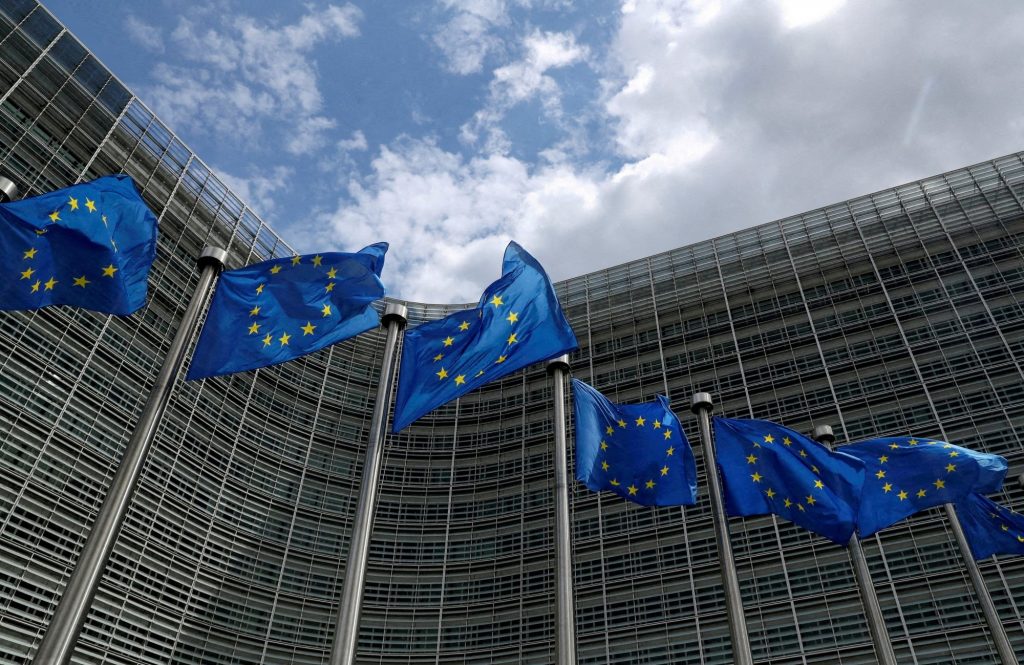
European Commission Reprimands Greek Gov’t Over Corruption, Protection of Journalists, Use of Spyware, Consultation
The Commission makes recommendations to the Greek government about fighting corruption, protecting the freedom of the press, shedding light on the wiretapping scandal and respecting the rules on consultation
Τhe final text of the European Commission’s assessments and recommendations on the state of the Rule of Law in Greece and the other EU Member States has been released. (you can read the whole thing here: Country report_Greece)
As in was first to reveal, the Commission is quite critical of the Rule of Law situation in Greece.
Citizens’ confidence in the independence of the judiciary remains at middling levels (40% for citizens, 48% for businesses). The report also records the fierce reaction of Greek judges to the European Parliament’s Resolution expressing serious concerns about the Rule of Law in Greece, but also highlights the Athens Bar Association’s response to the effect that “justice cannot be above criticism”.
It points out that serious issues remain unresolved with regard to the length of proceedings before the civil courts and the Council of State, although some improvements have been made vis-a-vis the ordinary administrative courts.
Problems with the fight against corruption and the freedom of the Press
The report notes the issues that have still to be dealt with in the fight against corruption and, in particular, establishing a track record of prosecutions and final judgements in corruption cases.
In relation to press freedom and journalists being able to do their job, the report notes that: “journalists’ associations have criticised the amended provisions of the Criminal Code and the Code of Criminal Procedure which increased the minimum sentence for slanderous defamation and reduced significantly the possibility of suspending sentences imposed at first-instance when they are appealed. However, the Greek government submitted that, to date, courts have not imposed a prison sentence of more than two years on a journalist for the offence of slanderous defamation.” At the same time, it notes journalists’ concerns about abusive SLAPP-type lawsuits, noting also that such lawsuits have also been used to target reporting on the use of illegal spyware. It also cites the complaints and concerns of journalists about issues relating to their safety in the face of threats.
The report points out that complaints have also been made about insufficient consultation in relation to draft legislation, a problem exacerbated by provisions being added to the final text of the law without having first been submitted to public consultation.
Problems with the workings of the country’s independent authorities
The functioning of Greece’s independent authorities also comes in for negative comments. For example, the report notes that, before all else, they suffer from understaffing. The report refers to the Ombudsperson positively, and to the fact that it launched its own independent investigation into the Pylos shipwreck, noting the support the authority has received from the Council of Europe in its work.
However, it also notes the problems reported by the Hellenic Authority for Communications Security and Privacy (ADAE) and the Data Protection Authority (DPA) during their investigation into the spyware case. Of course, the report also notes that this case is still ongoing. The report also makes a specific reference to the Athens Bar Association’s appeal before the Council of State in relation to the decision to change the members of the Board of the ADAE, which was made by “rounding down” the constitutionally required majority:
“The Conference of Presidents of Parliament replaced members of the National Council for Radio and Television (NCRTV) and the Authority for Communication Security and Privacy (ADAE), whose mandate had expired. These appointments have, however, been subject to discussion among political and legal experts questioning whether there was an attempt of undue interference with the functioning of these independent authorities. According to the Government, the appointments were in line with the Constitution and the new members are widely recognised experts. In November 2023, the Athens Bar Association filed two annulment applications before the Council of State against the appointment decisions, claiming that they were in violation of the Constitution. The independent authorities consider that their status is severely affected by the mere impression that they operate under pressure. They also argue that the current appointment procedure […] exposes the authorities to undue political influence and should be reviewed.”
Criticisms over the wiretapping case
In relation to the wiretapping case, the final text of the report includes an inaccuracy vis-a-vis the ADAE which, having also been present in the draft, was drawn attention to by in. It thus erroneously says that, in October 2023, the ADAE declared itself incompetent to cross-check the lists of those under surveillance by the NSA and Predator. However, this overlooks certain events that occurred in the meantime. Namely, that the ADAE, through its president Christos Rammos, had requested the lists in question in a letter to the deputy prosecutor, Achilleas Zisis, who decided to perform the comparison himself, for which purpose he visited the NSA with a court expert. However, the report remains critical about this issue:
Judicial investigations into allegations of wiretapping and the use of spyware started in 2022 and are ongoing. In July 2023, the Data Protection Authority (DPA) released the findings of its investigation and forwarded them to the judicial authorities. In October 2023, the ADAE rejected the prosecutors’ request to verify whether the individuals targeted with spyware were also subject to wiretapping activities by the National Intelligence Service. In October 2023, the Prosecutor of the Supreme Court ordered the transfer of the investigation file from the first-instance prosecutor’s office to the Supreme Court. This decision was met with criticism, including by press freedom organisations, as it was viewed as an attempt to interfere with the ongoing investigation and further delayed its progress. According to the Council of Europe Platform for the safety of journalists, the criminal investigations into the use of spyware lacked clarity. The Parliamentary Assembly of the Council of Europe urged
Greece to conduct effective, independent and prompt investigations into all cases of abuse of spyware and provide sufficient redress to victims. In March 2024, the Government submitted its reply to the Parliamentary Assembly in relation to the Resolution providing information on investigations of reported individual incidents conducted in courts, by the National Transparency Authority and by the Parliament, as well as on improvements of the applicable legal framework. In April 2024, the Council of State ruled that the provision applicable at the time stipulating that an individual under surveillance for national security reasons could not be informed about this, is unconstitutional.”
The report is also critical of the low level of compliance with judgements of the European Court of Human Rights
On 1 January 2024, Greece had 28 leading judgments of the European Court of Human Rights pending implementation, an increase of one compared to the previous year. At that time, Greece’s rate of leading judgments from the past 10 years that remained pending was at 30% (compared to 34% in 2023) and the average time that the judgments had been pending implementation was 6 years 7 months (same as in 2023). One of the oldest group of cases, pending implementation for more than 15 years, concerns violations of the right to freedom of association due to the domestic courts’ rulings not to register or to dissolute associations on the grounds that their aim was to promote the idea that an ethnic minority existed in Greece. As regards the respect of payment deadlines, on 31 December 2023 there were 7 cases in total awaiting confirmation of payments (compared to 13 in 2022).”
Finally, the report is of the opinion that there are still problems with the legal framework regulating NGO activities, particularly in the field of migration and the registers that have been established, and points out the criticisms that exist: “According to the NCHR, the inconsistent and on-transparent application of the legal requirements for registration and the increased formalities has led many CSOs either to leave Greece or reduce their presence in the field. The Council of Europe Commissioner for Human Rights referred to the Greek registration system as raising concerns.”
The final recommendations
In the final recommendations section, the Commission notes that some progress has been made in several areas such as the involvement of the judiciary in the appointment of the President and Vice-President of the Council of State, the Supreme Court and the Court of Audit; the fight against corruption; the protection of journalists and press freedom; consultation; the registration system for civil society organizations (CSOs) and dialog with them. (Read the full annex with the recommendations to all the Member States here: Annex to Communication.)
However, at the same time, the Commission is clearly rapping the Greek government on its knuckles in a series of recommendations relating to the need to improve the situation in specific areas. These relate to the need to create a situation in which final judgments are reached in high-level corruption cases; the need to introduce safeguards to protect journalists, especially against abusive lawsuits; the need for real and timely consultation on draft legislation (as opposed to the “express consultations” we have seen); and, of course, the need for structured dialog with civil society organizations, including NGOs, who have often complained about their treatment in Greece.
The full text of the Commission’s assessments and recommendations follows:
Overall, concerning the recommendations in the 2023 Rule of Law Report, Greece has (made):
-Fully implemented the recommendation to address the need for involvement of the judiciary in the appointment of President and Vice-President of the Council of State, the Supreme Court and the Court of Audit taking into account European standards on judicial appointments.
-Some further progress on stepping up efforts to establish a robust track record of prosecutions and final judgments in corruption cases, including high-level corruption.
-Some further progress on taking forward the process of adopting non-legislative safeguards and significant progress on starting the legislative process in relation to the protection of journalists, building on the activities initiated by the Task Force, in particular as regards abusive lawsuits against journalists and their safety, in line with the adopted Memorandum of Understanding and taking into account European standards on the protection of journalists.
-Some progress on ensuring the effective and timely consultation in practice of stakeholders on draft legislation, including by allowing sufficient time for public consultation.
-Some further progress on taking further steps to evaluate the current registration system for civil society organisations, including by initiating a structured dialogue with CSOs, and assess whether there is a need to amend it.
On this basis, and considering other developments that took place in the period of reference, and in addition to recalling the relevant commitments made under the Recovery and Resilience Plan, it is recommended to Greece to:
-Continue efforts to establish a robust track record of prosecutions and final judgments in corruption cases, including high-level corruption.
-Further advance with the process of adopting legislative and non-legislative safeguards to improve the protection of journalists, in particular as regards abusive lawsuits against journalists and their safety, in line with the adopted Memorandum of Understanding and taking into account European standards on the protection of journalists.
-Step up the efforts to ensure the effective and timely consultation in practice of stakeholders on draft legislation, including by observing the statutory timeframe for public consultation.
–Strengthen efforts to evaluate the current legal framework for the registration system for civil society organisations and assess whether there is a need to amend it, while moving forward with a structured dialogue with CSOs.”
Source: tovima.com
Ακολουθήστε το in.gr στο Google News και μάθετε πρώτοι όλες τις ειδήσεις








































 Αριθμός Πιστοποίησης Μ.Η.Τ.232442
Αριθμός Πιστοποίησης Μ.Η.Τ.232442